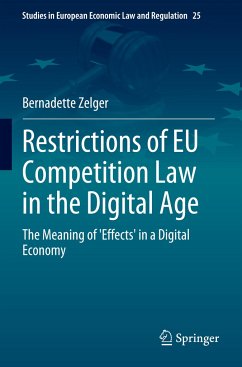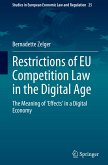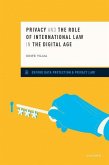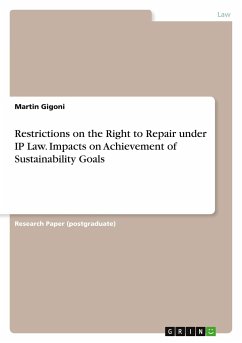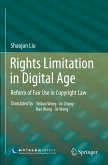This book offers an in-depth legal analysis concerning the notion of restrictions of competition, be it by object restrictions according to Article 101 TFEU or prima facie abusive practices treated according to the form-based approach under Article 102 TFEU. Although extensive research has been conducted on the notion of object infringements of competition, there is no systematic review of this topic covering both competition provisions, namely Articles 101 and 102 TFEU. This book fills that gap by providing an extensive analysis of the relevant case law, while also covering new phenomena stemming from the digital revolution and its impact on the functioning of traditional markets.
In this regard, particular attention is paid to the concept of prima facie infringements and the analysis necessary for their successful establishment. Object restrictions and object abuses are not infringements per se in the sense that they can be established in the abstract and without consideration of the actual legal and economic context (context analysis) within which a measure is implemented. Hence, the indispensable context analysis is informed by the potential economic effects of a given measure.
Examining the changes regarding the economic reality and how markets work in the digital economy, this book makes a valuable contribution to the current debate about whether our competition law toolkit is fit and proper to deal with the challenges posed by digitalization. The author argues that while there is a coherent framework covering both Treaty competition provisions as regards object restrictions of competition, the increased use of an actual effect analysis and thus the concept of a restriction of competition by effect represents an underestimated (and underused) weapon for combating measures that are ambivalent from a competition law perspective as regards their (anticompetitive or non-detrimental) nature in a digital economy.
In this regard, particular attention is paid to the concept of prima facie infringements and the analysis necessary for their successful establishment. Object restrictions and object abuses are not infringements per se in the sense that they can be established in the abstract and without consideration of the actual legal and economic context (context analysis) within which a measure is implemented. Hence, the indispensable context analysis is informed by the potential economic effects of a given measure.
Examining the changes regarding the economic reality and how markets work in the digital economy, this book makes a valuable contribution to the current debate about whether our competition law toolkit is fit and proper to deal with the challenges posed by digitalization. The author argues that while there is a coherent framework covering both Treaty competition provisions as regards object restrictions of competition, the increased use of an actual effect analysis and thus the concept of a restriction of competition by effect represents an underestimated (and underused) weapon for combating measures that are ambivalent from a competition law perspective as regards their (anticompetitive or non-detrimental) nature in a digital economy.
"Each chapter ends with a pleasant and very clear interim result, which continues the very structured and logical argumentation thread ... . this book makes a valuable contribution to the current debate about whether our competition law toolkit is fit and proper to deal with the challenges posed by digitalization." (Eduard Paulus, ÖZK, Österreichische Zeitschrift für Kartellrecht, Issue 6, 2023)

